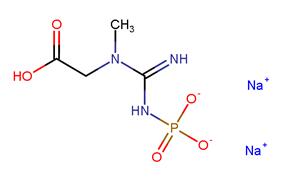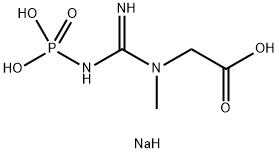Medical applications of Creatine Phosphate Disodium Salt
Creatine phosphate belongs to the human body and is the most important type of energy supplier. It can provide energy support for various tissues and organs. In human brain, kidney, cardiac muscle and skeletal muscle, 80% of the energy source is creatine phosphate[1]. In humans, the synthesis of creatine phosphate begins in the kidney organs. A guanidinic acid is formed from arginine and glycine, and then creatine is formed through methylation in the liver. Finally, it is phosphorylated in various cellular tissues[2]. And creatine phosphate is formed. Creatine phosphate disodium salt is a commercial creatine phosphate drug, which has become more and more widely used in acute myocardial infarction in recent years, and has achieved good results.

Creatine phosphate disodium salt is a white needle-like crystalline powder that is easily soluble in water. In medicine, it can protect the heart muscle by injecting creatine phosphate disodium salt, and can also be used to treat myocardial abnormalities in the ischemic state. creatine phosphate plays an important role in energy metabolism during muscle contraction[3]. The use of creatine phosphate is generally by intravenous injection. Phosphocreatine disodium salt exists as creatine phosphate after entering the body. Its main role is the effect of creatine phosphate, as follows:
(1) Cardioprotective agents
Creatine phosphate is widely distributed in various tissues of the body. Creatine phosphate is used to maintain ATP levels. Exogenous creatine phosphate has myocardial protective effect, stabilizing cell membrane and mitochondrial membrane structure stability, improving microcirculation of myocardial ischemic site, stabilizing intracellular adenylate content[4], etc. The protective effect is better than ATP. Clinically used for cardioprotection and other conditions of myocardial metabolic distress. Applicable to the adjuvant treatment of myocardial ischemia, hypertrophy, myocardial infarction and heart failure. Can also be used for various heart surgeries.
(2) The role of the buffer
In addition to providing energy, creatine phosphate can also act as a buffer for controlling acidic substances in muscles during high-intensity exercises[5]. This is because creatine phosphate needs to consume the hydrogen ions released from the lactic acid accumulated in the muscles during the high-intensity exercise, and too much hydrogen ions in the muscle can hinder muscle contraction, so creatine phosphate can buffer and delay the appearance of fatigue.
(3) Creatine phosphate also has the effect of stimulating growth hormone secretion
The synergy between taurine and creatine phosphate promotes the synthesis. With sufficient protein or amino acid supplementation, the synthesis rate and effect of muscle protein are better[6]. Under the premise of sufficient protein or amino acid supplementation, the speed and effect of muscle protein synthesis are better.
(4) Sports supplements preferred by athletes
Phosphocreatine has a significant effect on increasing athletes' physical fitness and performance, is safe and effective, and has no side effects[7]. Increased levels of creatine phosphate during training can improve training and competition performance.
References
[1] Strumia E, Pelliccia F, D’Ambrosio G. Creatine phosphate: pharmacological and clinical perspectives[J]. Advances in Therapy, 2012, 29(2): 99-123.
[2] Signoretti S, Di Pietro V, Vagnozzi R, et al. Transient alterations of creatine, creatine phosphate, N-acetylaspartate and high-energy phosphates after mild traumatic brain injury in the rat[J]. Molecular and cellular biochemistry, 2010, 333(1-2): 269.
[3] Qi C, Zhu Y J, Lu B Q, et al. Hydroxyapatite Hierarchically Nanostructured Porous Hollow Microspheres: Rapid, Sustainable Microwave‐Hydrothermal Synthesis by Using Creatine Phosphate as an Organic Phosphorus Source and Application in Drug Delivery and Protein Adsorption[J]. Chemistry–A European Journal, 2013, 19(17): 5332-5341.
[4] Chen F, Zhu Y J, Zhao X Y, et al. Solvothermal synthesis of oriented hydroxyapatite nanorod/nanosheet arrays using creatine phosphate as phosphorus source[J]. CrystEngComm, 2013, 15(22): 4527-4531.
[5] Brosnan J T, Da Silva R P, Brosnan M E. The metabolic burden of creatine synthesis[J]. Amino acids, 2011, 40(5): 1325-1331.
You may like
Related articles And Qustion
See also
Lastest Price from Creatine phosphate disodium salt manufacturers

US $0.00/Kg/Bag2025-04-21
- CAS:
- 922-32-7
- Min. Order:
- 1KG
- Purity:
- 98%min
- Supply Ability:
- 100kg

US $10.00/KG2025-04-21
- CAS:
- 922-32-7
- Min. Order:
- 1KG
- Purity:
- 99%
- Supply Ability:
- 10 mt



